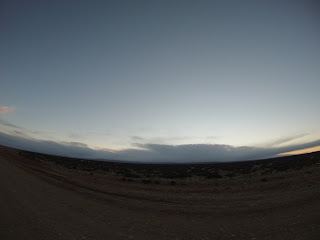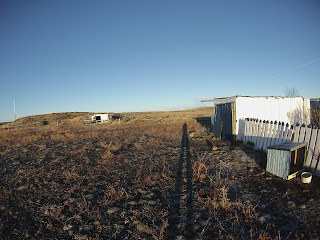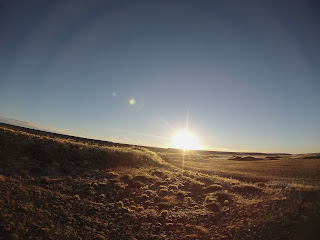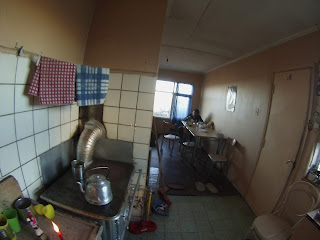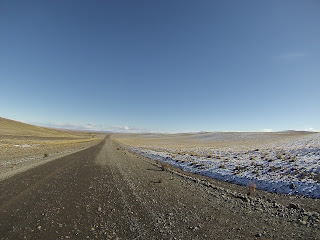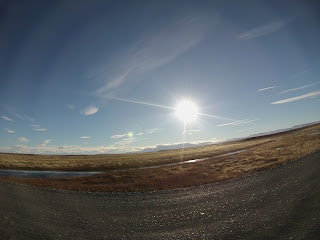An easy descent out of Calafate. Again the
police stopped us for documents but this time they didn’t want to search the
bags. The police seem more curious about our gear than about actual contraband. Carlos stopped by an estancia for water, we continued
to ride and the landscape was tan and barren and I wore the leg and arm warmers
and headed up a 10km cuesta. Along the way one of the Presidenta’s large
estancias—she owns quite a bit of land in Santa
Cruz--appeared below. At the summit of the cuesta the Rio Santa Cruz
twisted wildly in the valley. A wicked tailwind began and suddenly we were sailing
along at 60kpm without pedaling. In 20 minutes I couldn’t feel the toes and
fingers. I stopped near a mound in shelter from the wind and put on the second
pair of gloves. The feet would have to wait—the wind was too strong to try anything.
We sailed to a large municipal building and were
very cold and taken by surprise by the strength and cold of the wind. As Carlos
attempted to park his bike alongside the municipal building, a man chased him
away—it seemed the man valued the small patch of grass more than basic
hospitality. We regrouped in an adjacent shed, shaken by the intense wind. I
put on the thermal shirt and rain pants, balaclava and rain boots over the
shoes. I walked up to the municipal building and the angry man sheepishly let
me inside. I told him we were caught in the wind and in need of some sort of
shelter against the wind to arm the tents. La Esperanza was a long way away,
and would add 180km to the route, doubling back. There was an estancia 15km in
the direction of La Esperanza, but we would face a headwind if we doubled back.
We could take a ripio path, he said, that would shortcut back to Ruta 40. It
would be 65km in total, but in 15km there would be a police outpost where we could
camp and fill the water bottles.
We rode 15km in a tailwind and crosswind to
destacament policial Tomas Sosa. There were thick green tufts of grass among
tan brush and rocky desert soil. The sky grew pink and magenta and red as the
sun set. We reached the police outpost, a home of 4 rooms with diesel tanks
alongside a stream. The lights were out and no one was home. But in the wind
and cold we set up camp and cooked yerba mate and pasta. The tent was well stabilized, tied to two boulders
with all 4 panniers inside and the two half-full water bags. Carlos began to
cook some polenta when a truck arrived and pulled in the gravel drive next to a
shed. Loud music from the campo could be
heard from the open door. A tall, large man emerged. Carlos and I exited the tents and approached the man with an apology: we were sorry for camping on
his grounds without permission, but it was pitch dark, the wind was terribly
strong, and it was very cold. Could we camp for the night?
No, he said. We could come inside, get warm, and
sleep inside. We were still in a state of shock from the incredible kindness of
Pato, Ivor, Mariano, and Juliana. It was strange to disarm the tents, bring in
the polenta, and continue cooking in Fabian’s kitchen. As we brought our gear
in, sleet began, then a snow. We would have been fine in our tents, but it was
good to be inside.
We finished cooking our Polenta on Fabian’s
stove and sat down at his spartan kitchen table and ate the hot food.
Fabian set down a basket of tortas fritas and we ate them quickly. Fabian began to share the story of his life. He missed his daughter in Calafate. Fabian separated in 2005 and the divorce was settled in
2011. Originally from Rio Gallegos, he had been in the police outpost for 3
years and lived alone with Diego and Toni, his two dogs, and a cat, a cat who preferred
the outside and would stare blankly through the window at night.
Fabian had worked on the campo, on the
estancias, when he was younger. He did everything—repaired roofs, worked with
the sheep, horses, and cattle. You worked from 6 til 12, then 2 till 6. You
mostly ate asado. There was little drink, because the gauchos fight with knives
over anything when they drink.
There was Fabian's life at the outpost. It wasn’t
that much different from life on the campo—there was constant work on the house
and every few days he would drive a patrol. But there were no inhabitants. La
Esperanza was 100km away. There were a few estancias. Sometimes there were
knife fights, sometimes auto accidents. But he lived alone. He missed his
daughter in Calafate but not his ex-wife. Women weren’t worth the trouble.
There was beauty and isolation at the outpost.
At midnight the three of us felt like old
friends catching up—there was that relief and sadness upon seeing a long lost
companion, that they were still the same good person, that they still had
stories, that the time would pass so quickly that you felt cheated by the paltry
minutes and hours in a day.
But I could stay awake no longer at midnight and
Carlos and I went into our room where there was a bunk bed waiting for us.
It had been decorated for his daughter but she had not visited for the last few years. Fabian turned off the generator and the lights went out. I tried to read for a
few minutes but passed out from exhaustion from the wind, the cold, and the
115km I had ridden that day, some of it at 8km an hour, some of it at 60km an
hour.
In the morning I awoke and our pots and cups had
been washed. A red candle burned for Gauchito Gil. I went outside and the
sunrise was pink and purple and frost covered the ground and a blanket of snow
covered the distant mountains and the Torres del Paine still further distant.
Carlos and I ate oatmeal and powdered milk and Fabian served us more tortas
fritas which we ate with dulce de leche. Fabian showed us his guest book that
passing cyclists had signed. He knew little of cycling but he had welcomed many
to camp on his land and stay in his home. Many had sent him postcards, letters,
photos of subsequent weddings. They had come as strangers and had left as old
friends.
Soon the sun warmed the sky and frost began to
melt and we packed our bags and readied our bikes. Fabian rode both our bikes
and found my bicycle amusing. We signed his guestbook, exchanged embraces, and
set off on the ripio in the still and sunny day.
Over rolling hills, the mountains were to our
west and the ground was snow covered. We passed guanacos and nandu. Then the
road headed southwest and the wind began fiercely northeast. The ripio grew
uglier, steeper, muddy, rocky, uneven. The severity and desolation of the
pampas flattened expectations of hope and relief. I rode in thick, wet, sandy
soil and stones and put my head down in the wind. I thought of the legend of the man who had
ridden Ruta 3 from Buenos Aires
to Ushuaia. How did he withstand the desolation and constant wind, day after
day?
The toes and hands hurt but I knew I could get
to the crossing at Ruta 40. It took 6
hours to ride 45km to the crossing and we stopped at a large warm police outpost
and inquired about lodging. There was nothing. An abandoned hotel 15km down the
road but in the headwind we would run out of light. There was shelter next to a
garage of a gas station but the generator was loud and the smell of diesel
strong. The police offered a fenced in area adjacent to the outpost which
offered shelter from the wind. We set up camp there, and heated yerba mate
which restored the spirits.
A Brazilian, Marcelo, pulled up in his camper to
spend the night at the police outpost. We had met him at the gas station
earlier and he had returned to camp for the night realizing he could not make
Rio Gallegos. He offered us use of his kitchen and invited us to cook and drink
mate with him. Marcelos was from Sao Paulo and
had left a fancy job to explore South America
and film documentaries of wildlife. He had lived many years in the North of
Brasil and knew Amazonas well. His camper was robbed in Gobernador Gregores and
they took his television, his Iphone, but most importantly they took his small
table. But he was at peace with the matter. He followed the philosophy of
Dharma and its four teachings. Suffering is the result of the illusion we
project, the contradiction of what we want--which is the culmination of the
many reincarnations of our past lives—and the illusion of the reality that we project. To end the vicious circle of suffering, we align our wants with the
illusion of our projections. Hence one can introduce the concept of
nothingness, only carefully.
Marcelos roasted mushrooms and peppers in his
oven and made us a salsa for our pasta. The three of us ate pasta together and it
was good to eat fresh vegetables with the pasta in place of the typical salsa
of mayonnaise. We passed a cup of yerba mate into the night and conversed in
Portenol. By 9:30 Carlos and I were exhausted and retired to our tents.
In the morning we bid farewell to Marcelo,
packed up camp, filled our bags and bottles with water from the police outpost,
and set off west on Ruta 40, a dangerous direction should the wind begin.
The wind began at 4, about an hour earlier than
we expected. The goal was to reach an estancia in 40km and shelter from the
wind. At 32km a shed appeared and we stopped for shelter. I changed the socks
for a dryer, warmer pair and covered the feet with the sturdy rain covers. We
pushed hard in the headwind for the next 10km and the road turned south, the
wind disappeared, and suddenly trees populated the snowy landscape. Torres Del
Paine gazed at us in the distance. It was all I needed to see. I had no right
to approach such a beast.
It was 5 in the evening and there were two hours
of daylight and 45km to Rio Turbio. We decided to go for it, and so long as the
road was flat and we encountered no more wind, it seemed feasible. Yet
difficult rolling hills began and my spirits were deflated. At least there were
trees and the camping would be good and there would be no wind heading south,
sheltered by the mountains.
After attacking the rolling hills for 15km the
descending began. Soon the beauty and desolation of Santa Cruz was met with a large coal burning electricity
plant, a large mine, then a large industrial city laid down upon the valley.
It was Rio Turbio and it was concrete and
utilitarian yet alive as it grew dark and cold. It was labor day and most of
the stores were closed. There was no camping to be seen near the city so we
inquired about cheap alojamiento. We rode through small streets, chased by
dogs, and arrived, hungry and cold, at a modest establishment. The woman wanted
280 pesos, seven times what we had paid in Calafate. I remembered that Gustavo
had once slept at the bomberos, so we rode to the bomberos. The bomberos did
not offer us shelter, but told us we could ascend in the dark out of town and
camp. But we knew this but realized that riding towards the border in the dark
would be a great risk. We would not be able to see the ice on the road and
would not be visible to traffic.
We inquired with a policeman and he directed us
to a municipal building, a large yellow industrial edifice. But we were skeptical and decided we should
eat something first if we eventually had to ride out of the city in the dark.
We ate bread, salami, and cheese next to an almacen and assumed the worse.
We set off for the municipal building. Carlos
entered the open building and explored while I waited with the bikes. Soon a
young man approached and I explained we were looking to put down our sleeping
bags for the night. He telephoned his boss but could not offer us shelter.
Resigned to camp on a nearby patch of grass, we began to arm the tents when a
truck pulled up near the municipality. Carlos approached a couple and explained
that we simply wanted to lay down sleeping bags for the night, nothing more.
They were shocked we were not offered shelter. The man made a phone call and
soon another man arrived in a truck and gave us a tour of the municipal
building. There were empty dorms for visiting sports teams and he would be
happy to offer us beds, showers, a kitchen. He left us with a key to the
dormitory.
We set down our gear in the dorm and set off to
a nearby almacen for more food. A woman recognized us from our earlier search
and prepared by hand 4 rich empanadas for us and give them to us without
charge. She made a point of telling us
they were Argentinean empanadas and would be the best we would ever taste. She
was not incorrect, but it’s difficult to say such things so close to the
Chilean frontier.
That night I took a hot shower, washed some
gear, laid them to dry on radiators, and cooked up yerba mate in the kitchen.
There were two others in the building but we had a dorm of 20 beds to
ourselves.
In the morning we had breakfast with one of the
municipal workers. He was born in Rio Turbio and his father had come in 1978 to
work in the carbon mines. Originally Chileans, the Polish, Germans came to work
in the mines. Puerto Natales was very close and the old Ruta 40, once entirely
bad ripio, was long journey back then to Rio Gallegos. He spoke of the industry, of the
carbon mines, natural gas, the petroleum. There was a mountain of resources but
no wealth to show for it. It went to the same mafia of families and
politicians, little to the people.
We set off that afternoon for an easy 40km to
Puerto Natales and passed the Argentinean and Chilean control with ease. Carlos
remarked that the land suddenly became more beautiful, but to me it is all Patagonia. Patagonia can be the wet green of the
Carretera Austral and the wind and desolation of Santa Cruz. It can be Chos Malal in the north
and Puerto Natales in the south.
Puerto Natales is a tranquil city situated on an
ocean fjord overlooking mountains, now empty of tourists. We found a
cheap, family run alojamiento and soon found a cheap local restaurant where
Carlos introduced me to paila marina, a rich broth of mussels and fish served
with aji peppers. We stocked up on groceries and will set off 250km to Punta Arenas after one day of rest. 250km to Tierra del Fuego. Now begins
the second month of Autumn as we ride further South.















